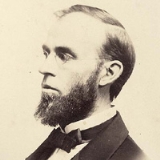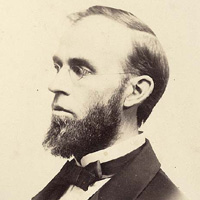
Arthur Latham Perry
Encyclopedia
Arthur Latham Perry born in Lyme
, New Hampshire
, was a prominent American economist and advocate of free trade
. He graduated from Williams College
He graduated from Williams College
in 1852 and was Orrin Sage Professor of history and political economy there from 1853 to 1891, when he became professor emeritus. He advocated free trade, and in 1868-69 publicly debated this question with Horace Greeley
in Boston and New York. His book Political Economy (1865) went through 22 editions during his life, and his Introduction to Political Economy (1877) went through five editions. His final statement came in 1891 with his Principles of Political Economy.
Though he was the "most widely read American economist of his time", with his texts taking only third place in sales behind those of Adam Smith
and J.S. Mill, his name does not appear in most histories of economics, such as that of Joseph Schumpeter
. The reason for this later neglect may lie in the general decreased reputation for the scholarship of the French Liberal School
of Frédéric Bastiat
, the general approach of which Perry carried on. Perry conceived of economics as the "science of Buying and Selling," or, as Richard Whately
earlier termed it, catallactics
.
His basic case against protectionism
was that it benefited the rich at the expense of the poor, the industrialists at the expense of farmers and others, as is indicated in the title of his widely circulated pamphlet, "Foes of the Farmers."
Lyme, New Hampshire
Lyme is a town in Grafton County, New Hampshire, United States. The population was 1,716 at the 2010 census. Lyme is home to the Chaffee Natural Area. The Dartmouth Skiway is in the eastern part of town, near the village of Lyme Center...
, New Hampshire
New Hampshire
New Hampshire is a state in the New England region of the northeastern United States of America. The state was named after the southern English county of Hampshire. It is bordered by Massachusetts to the south, Vermont to the west, Maine and the Atlantic Ocean to the east, and the Canadian...
, was a prominent American economist and advocate of free trade
Free trade
Under a free trade policy, prices emerge from supply and demand, and are the sole determinant of resource allocation. 'Free' trade differs from other forms of trade policy where the allocation of goods and services among trading countries are determined by price strategies that may differ from...
.

Williams College
Williams College is a private liberal arts college located in Williamstown, Massachusetts, United States. It was established in 1793 with funds from the estate of Ephraim Williams. Originally a men's college, Williams became co-educational in 1970. Fraternities were also phased out during this...
in 1852 and was Orrin Sage Professor of history and political economy there from 1853 to 1891, when he became professor emeritus. He advocated free trade, and in 1868-69 publicly debated this question with Horace Greeley
Horace Greeley
Horace Greeley was an American newspaper editor, a founder of the Liberal Republican Party, a reformer, a politician, and an outspoken opponent of slavery...
in Boston and New York. His book Political Economy (1865) went through 22 editions during his life, and his Introduction to Political Economy (1877) went through five editions. His final statement came in 1891 with his Principles of Political Economy.
Though he was the "most widely read American economist of his time", with his texts taking only third place in sales behind those of Adam Smith
Adam Smith
Adam Smith was a Scottish social philosopher and a pioneer of political economy. One of the key figures of the Scottish Enlightenment, Smith is the author of The Theory of Moral Sentiments and An Inquiry into the Nature and Causes of the Wealth of Nations...
and J.S. Mill, his name does not appear in most histories of economics, such as that of Joseph Schumpeter
Joseph Schumpeter
Joseph Alois Schumpeter was an Austrian-Hungarian-American economist and political scientist. He popularized the term "creative destruction" in economics.-Life:...
. The reason for this later neglect may lie in the general decreased reputation for the scholarship of the French Liberal School
French Liberal School
The French Liberal School is a 19th century school of economic thought, that was centered around the Collège de France and the Institut de France. The Journal des Économistes was essential in promulgating the ideas of the School...
of Frédéric Bastiat
Frédéric Bastiat
Claude Frédéric Bastiat was a French classical liberal theorist, political economist, and member of the French assembly. He was notable for developing the important economic concept of opportunity cost.-Biography:...
, the general approach of which Perry carried on. Perry conceived of economics as the "science of Buying and Selling," or, as Richard Whately
Richard Whately
Richard Whately was an English rhetorician, logician, economist, and theologian who also served as the Church of Ireland Archbishop of Dublin.-Life and times:...
earlier termed it, catallactics
Catallactics
Catallactics is the praxeological theory of the way the free market system reaches exchange ratios and prices.It aims to analyse all actions based on monetary calculation and trace the formation of prices back to the point where an agent makes his or her choices. It explains prices as they are and...
.
His basic case against protectionism
Protectionism
Protectionism is the economic policy of restraining trade between states through methods such as tariffs on imported goods, restrictive quotas, and a variety of other government regulations designed to allow "fair competition" between imports and goods and services produced domestically.This...
was that it benefited the rich at the expense of the poor, the industrialists at the expense of farmers and others, as is indicated in the title of his widely circulated pamphlet, "Foes of the Farmers."

